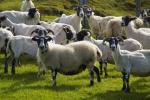Ash4Soil Operational Group: Productive improvement of soils, agricultural crops and forest plantations through an amendment obtained from the valorization of biomass ash.
- Type Operational group
- Status In progress
- Execution 2024 -2027
- Assigned Budget 575.700,36 €
- Scope Supraautonómico
- Autonomous community Extremadura; Galicia
- Main source of financing CAP 2023-2027
- Project website GO ASH4SOIL
Ash4Soil aims to improve the health of acidic soils by increasing agricultural and forestry productivity through the use of an amendment-fertilizer derived from the valorisation of ashes and slurry from cattle, pigs and chicken manure, reducing the use of liming agents and synthetic nitrogen fertilizers and the carbon footprint of all sectors involved.
In this sense, a physicochemical and agronomic characterization of mixtures of waste from livestock farms (slurry and chicken manure) and the forestry industry (ash) is carried out and an integrated sustainability indicator of the product obtained will be developed, which will assess productive, environmental and social aspects, and will be validated by the end users of the product.
The circular economy and sustainability of agricultural and forestry activities will also be promoted by improving their productivity and reducing their overall costs, reducing the use of synthetic inputs and the emission of direct and indirect greenhouse gases (production and transport), and valorising the waste generated, all of which will be validated by the development of a protocol and a registration report for the new product.
The Ash4Soil GO aims to evaluate the benefits in terms of crop yield and forest cover of using an acid soil amendment made from ash obtained from burning forest residues, as well as its effect on crop productivity when combined with a high-quality nitrogen fertilizer made from slurry obtained from livestock farms.
The activities by expected result are:
- Act.1. R1. Physicochemical characterization of ashes from forest biomass as liming material.
- Act. 2. R1. Physicochemical characterization of cattle, pig and chicken manure as a potential fertilizer.
- Act. 3. R1. Formulation of the amending product.
- Act. 1. R2. Evaluation of the Ash4Soil amendment-liming product in a greenhouse.
- Act. 2. R2. Evaluation of the Ash4Soil liming-amendment product under agricultural field conditions.
- Act. 3. R2. Evaluation of the Ash4Soil liming-amending product under forest field conditions.
- Act. 1. R3. Evaluation of the economic, environmental and social sustainability of the ASh4Soil amendment-fertilizer product.
- Act. 1. R4. First validation of results in focus groups.
- Act. 2. R4. Second validation of results in focus groups.
- Act. 1. R5: Legislative study.
Europe is facing a major sustainability challenge in its agricultural and forestry systems, particularly regarding the use of inputs that improve soil health and fertility. A prime example is liming, a crucial practice in acidic soils (pH <5.5 for most of the year), where acidity significantly limits production.
Spain has approximately 40% acidic soils, where liming is essential to improve fertility and must be supplemented with the addition of fertilizers that are insufficient to meet crop needs (macronutrients N, P, and K). The liming materials used in Spain come from the eastern and southern peninsula (Tarragona, Barcelona, Almería) and require a large volume of non-renewable energy to transport them to Spanish areas with acidic pH, such as Extremadura, Castilla y León, and Galicia. The environmental costs derived from this transport could be addressed through the use of calcium-rich waste, such as ash, promoting the bioeconomy and the circular economy. Ash from burning forest residues for energy production currently constitutes an organic waste whose current destination is landfill.
However, its liming capacity is notable, since the main component of the ash is calcium, the liming material par excellence.
Specifically, in Galicia, this waste is widely available, allowing for business models associated with its reuse. However, soil microbiota, the true support of soil vitality and health, and crops also require nutrients supplied in the form of fertilization. Mineral fertilizers are widely used worldwide for this purpose, especially those that supply phosphorus and nitrogen.
A highly attractive alternative to mineral fertilizers is the use of slurry, the main residue from livestock farming, which can be recovered and used as a high-quality nitrogen fertilizer. This residue is widely available in the livestock-raising areas of Galicia, Extremadura, and Castile and León.
The objective of this project is to improve the quality of acidic soils and increase productivity in forestry and agricultural plantations through the development and use of an amendment-fertilizer called Ash4Soil, obtained from forestry and livestock waste. This will reduce the use of synthetic liming agents and fertilizers, reducing the carbon footprint of all involved sectors, promoting a circular economy, and the sustainability of agricultural and forestry activities.
The project is described in terms of the scope of a series of results:
- R1. Formulation and development of an amending product obtained from the physicochemical characterization and mixture of ashes from the burning of forest residues and livestock waste with fertilizing properties (slurry/chicken manure).
- R2. Agronomic valorisation of the amendment-fertiliser product by improving the pH in acid soils, which allows (i) reducing the cost of liming by at least 10%, (ii) improving agricultural and forestry productivity by reducing the need for mineral fertilisers by around 30% and (iii) reducing the farmer's production costs by around 20%, increasing forest productivity by around 10% by advancing the rotation.
- R3. Quantification of the economic, environmental and social sustainability indicators of the new amendment-fertilizer product and its production and of the integrated sustainability indicator.
- R4. Validation of the integrated sustainability indicator by the main stakeholders involved.
- R5. Determination of the properties and specifications to be met by the new product for its commercialization based on current regulations and legislation.
- Coordinator/entity name: Galician University Business Foundation (FEUGA)
- Postal address: R/Lope Gómez de Marzoa S/N - Campus Vida, Santiago de Compostela, A Coruña
- Coordinator/entity email: l.carbia@feuga.es
- Telephone: 981534180
- Fundación Empresa Universidad Gallega (FEUGA)
- Fundación Empresa Universidad Gallega (FEUGA)
- GREENALIA BIOMASS POWER CURTIS TEIXEIRO, S.L.U.
- ÁLVARO RODRÍGUEZ EIRAS S.L. (ARESA)
- SELGA, COMPAÑÍA GALEGA DE SILVICULTORES, S.L.
- SOCIEDADE COOPERATIVA A CARQUEIXA
- AGROBARCENILLA S.L.
- ALMACENES BOINA S.L,







